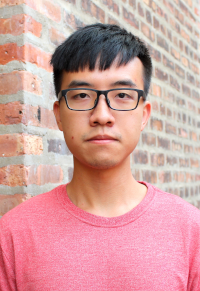
Student Highlight: Mingda Chen
Fifth-year PhD student Mingda Chen finds natural language processing interesting because it is such an abstract form of knowledge. His research attempts to leverage the data that is freely available online, looking at traces humans have left when they are doing various activities in everyday life. Chen hopes to make machines learn from this kind of data so that they can emulate a human’s ability to understand text.
As an undergraduate student at Zhejiang University, he majored in applied mathematics. His undergraduate thesis focused on using machine learning tools to classify images. “As a math student, all of the things I dealt with were very unrealistic. What’s cool about computer science is you can actually use it to solve real-world problems,” said Chen.
One of the things that he likes most about TTIC is that it is research-focused. PhD students don’t have any teaching obligations, and they are not required to take classes outside the realm of machine learning. Chen appreciates that the program is friendly to people from a variety of backgrounds, like mathematics, engineering, and other fields.
Currently, he is working on research in text generation. This work is attempting to enable the user to have more control over the generation system, so that when the user writes a sentence, the machine can write a sentence that shares similar syntactic structures. This could help with things like writing assistance in a word processor, where the machine could propose alternative writing suggestions.
Chen chose to pursue his PhD at TTIC because of the amount of time he would be allowed to spend on research direction. He knew that at TTIC, he would be able to explore a variety of interesting topics, and try a few different things before focusing entirely on one area. Currently, his path has led him to a summer internship at Facebook. He is working remotely for the Facebook offices in Menlo Park, California.
“My internship is related to what I mentioned earlier, leveraging this freely available data. Now we are trying to apply it to a few short learning scenarios, where you have a big system that has read a lot of texts, but then you only show the system one or two examples that you want it to do. Then, you want to see if the model can actually generalize to do these tasks. It’s like you have a task, and you ask a human to annotate data for you, and you only provide one or two examples,” said Chen. The internship began in early June, and will last about four months.
A Google PhD Fellowship has also played a major role in his time at TTIC. The fellowship provides him with a higher stipend, as well as a Google mentor who can provide him with insights into finding an industry career after graduation, and share his personal experience working at Google. “It gives you a little bit more freedom to explore whatever research topics you’d like to,” he said.
With one more year left at TTIC, Chen has begun to consider what he would like to do after graduation. His plans are not set in stone yet, and he would like to try both academia and industry for a while to gain more experience in both areas.

